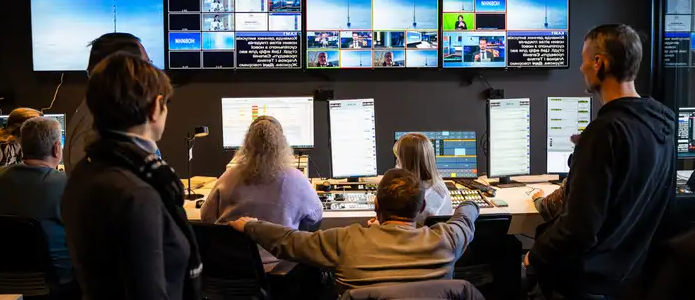
DW Akademie has been active in Ukraine since 2014, promoting freedom of expression, media viability and balanced reporting. It supports the public broadcaster in informing the population during the ongoing war.
The Ukrainian media landscape has changed fundamentally since the war broke out in February 2022. However, despite wartime censorship and additional restrictions on press freedoms, the country’s ranking has moved up significantly on Reporters Without Borders’ World Press Freedom Index. Ranked in 2022 at 106 out of 180 countries, it rose to position 79 in 2023 and to position 61 in 2024.
These higher rankings are mainly due to oligarchs losing their influence on the journalism and editorial policies of national TV stations. Their political and economic influence has declined sharply since the war began, and few public political disputes are now conducted via the media. As a result, oligarchs have lost interest in their own media (especially national TV channels) as platforms for political strife. This growing gap is being filled by Ukraine’s public broadcaster UA:PBC (Suspilne) and local media.
Nevertheless, ongoing reports jointly produced by and aired on six national TV channels, that are controlled by the president’s office and financed by the state budget, have undermined people’s trust in the media.
Observers point to two clear trends in the media market since 2022: people are moving away from television as their main source of information and towards social and online media (especially Telegram). At the same time, people’s trust in and the relevance of independent (online) media is growing. Although countering (Russian) disinformation is a major challenge as people increasingly consume news via (anonymous) Telegram channels, strengthening the relevance of local media in Ukraine is encouraged.
Our activities
DW Akademie has been active in Ukraine since 2014, supporting local independent media, public broadcasting (UA:PBC) and freelance journalism. Its ongoing projects help improve standards for journalistic qualifications and make basic and advanced training more practice oriented. It also provides comprehensive and needs oriented support to local independent media outlets.
Independent, reliable information is vital in times of war. As a result, the public broadcaster UA:PBC informs people about attacks, even if the alarm system is not working. DW Akademie keeps in close contact with its staff and partner organizations in Ukraine, including UA:PBC.
DW Akademie is supporting the project sponsor Ukrainian Institute for Media and Communication (UIMK) in developing training formats. The aim is to increase the media and digital skills of people over and to break old rigid ways of thinking. An accompanying study is analyzing the needs and ways to reach this target group. One example is for younger relatives to support older people in becoming more involved in social discourse and transformation processes.
Via the Journalism Teachers Academy (JTA), the UIMK offers training in methodology and didactics to teachers from Ukrainian university journalism faculties. The aim is for media outlets to draw from young better-trained media professionals. Cooperation is being planned with six Ukrainian universities.
The Educational Center Nakypilo continues to offer training positions that are practice-oriented and part of the School for Universal Editors (SUR) to enable trained editors to support staff at independent media outlets. The school’s financing is ensured through financial consulting and organizational development.
DW Akademie provides extensive support to local independent media outlets in Ukraine. It offers needs-oriented training for journalists and media managers as well as seminars and study trips to Germany to give space for discussions, reflection and networking. Together with “Maje Sens”, a new project partner and non-governmental organization, media managers will receive training and support in fundraising. The project runs from 2024-2025.
DW Akademie, together with the Ukrainian public broadcaster (Suspilne) and media organization Lviv Media Forum, is conducting the project “Strengthening Independent Media for a Strong Democratic Ukraine” (2024-2026). It is funded by the European Commission with the support from the German Federal Foreign Office.
The project aims to increase the long-term capacity of independent media, including the Ukranian public broadcaster, and promote an open constructive dialogue within the Ukrainian population. It also aims to support the National Council for Television and Radio Broadcasting as it strives to meet EU standards.
DW Akademie and Ukraine’s Lviv Media Forum are applying their expertise in supporting independent regional media in Ukraine, with a focus on niche media, constructive journalism and social participation. Suspilne is working more on investigative reporting and children’s content, and advancing its digital modernization process.
The project “MIL Initiative for Youth” by DW Akademie in partnership with Suspilne’s Public Academy Juniors is for young people (12-18 years old) and gives them a voice in local democratic processes.
Funding: German Federal Ministry for Economic Cooperation and Development (BMZ), German Federal Foreign Office (AA), European Commission (EU)
Program Directors: Dr. Kyryl Savin (BMZ), Hélène Champagne (EU)
Locations: Kyiv, Lviv, Cherkassy, Ternopil, Kharkiv, Odessa, Dnipro, Chernihiv, Mykolaiv, Dnipropetrovsk, Zaporozhye, Kherson, Mariupol, Donesk, Luhansk
Local Partners: Public Broadcasting Company of Ukraine UA:PBC (Suspilne), Educational Center Nakypilo, NGO “Maje Sens”, Ukrainian Institute for Media and Communication (UIMC),Lviv Media Forum (LMF)
Focus: Qualification and training for journalists, media viability, business journalism, civic participation (local), social participation, (local) participatory media formats and community media, media and information literacy (MIL), professionalism and journalist networks
https://akademie.dw.com/en/dw-akademie-in-ukraine/a-18549630